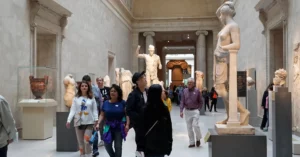Greece, a country nestled at the crossroads of the East and West, weaves a vibrant tapestry of culture. This introduction peels back the layers of Greek Culture, showcasing its diverse elements that have evolved over centuries.
Historical Influences and Independence
In tracing the roots of Greek Culture, one cannot ignore the profound impact of historical influences. The geographical position of Greece, at the confluence of the East and West, has shaped a cultural mosaic like no other. From the Romans’ occupation to the hard-fought independence from the Ottoman Empire in the 19th century, each chapter in Greece’s history imprints its indelible mark on the cultural canvas.
Unpacking the term “Greek Culture” illuminates the intense passion with which Greeks regard their heritage. This passion emanates not only from geographical influences but also from a deep-seated belief that their culture defines their national and ethnic identity.
Greek Culture: An Overview
In the vibrant tapestry of Greece, the term “Greek Culture” embodies a profound sense of identity and belonging. Let’s delve into the intricacies that make up this rich cultural heritage.
Passionate Pride in Heritage
At the heart of Greek Culture lies an intense pride, a deep-seated emotion that resonates in every conversation. The Greeks speak of their land with fervor, painting a vivid picture of how their cultural roots define their national and ethnic identity. This passionate pride serves as a guiding force, weaving through the fabric of daily life.
Components of Culture: Regions, Religion, Music, Language, Food, and Wine
- Regions: Greece’s diversity is not just a geographical reality but a cultural treasure. Each region contributes distinct nuances from the mainland to the islands, shaping Greek culture’s collective identity.
- Religion: A cornerstone of daily life, religion plays a pivotal role, with 98% of Greeks identifying as Christian Orthodox. This religious thread weaves through traditions, festivals, and societal norms, forming an integral part of Greek Culture.
- Music: The melodic mosaic of Greek music reflects a unique blend of Eastern and Western influences. Music isn’t just an art form here; it’s a historical journey, intertwining with ancient poetry, dance, and everyday life.
- Language: The Greek language, a descendant of the Ancient Greek, serves as the thread binding generations. From ancient inscriptions to modern communication, language is a vessel carrying the essence of Greek Culture.
- Food and Wine: Culinary delights form a sensory celebration of Greek Culture. From local specialties to widely cherished dishes, Greek cuisine is a testament to the importance of food in communal gatherings and traditions.
Traditions & Customs: A Harmonious Blend of Christianity and Paganism

Religious and Pagan Influences in Mainland Greece and Islands
In the rich tapestry of Greek Culture, traditions, and customs weave a story of coexistence between Christian beliefs and ancient pagan practices. This unique fusion is evident in the customs observed both in mainland Greece and its enchanting islands.
Christianity’s Tapestry
Greek Culture draws a vibrant thread from Christian traditions, deeply embedded in the fabric of daily life. From the mainland to the islands, the majority of customs have a Christian religious character. The influence of Orthodox Christianity, practiced by 98% of Greeks, permeates various aspects of life, shaping traditions in profound ways.
Pagan Echoes
However, beneath the surface of Christian customs, echoes of ancient pagan beliefs persist. Many traditions and festivals, celebrated with fervor today, have roots in the pre-Christian era. These customs create a fascinating mosaic of cultural expression, blending the old and the new.
Food and Wine: Gastronomic Delights
Culinary Diversity: A Flavorful Tapestry
Greek culture is intricately woven into its diverse culinary offerings. The rich tapestry of Greek cuisine reflects a harmonious blend of regional flavors and influences. The array of dishes varies not only from one island to another but also from the mainland to the high-mountain villages. This culinary diversity is a testament to the unique character of Greek culture.
In villages, towns, and bustling city markets, the local specialties showcase the essence of each region. From the aromatic herbs of the Peloponnese to the olive oil-infused creations of Crete, every corner of Greece boasts its own culinary identity. The local delicacies tell a story of tradition, history, and a deep connection to the land. This culinary exploration is a delightful journey into the heart of Greek culture.
Role of Food: A Cultural Foundation
Beyond mere sustenance, food plays a pivotal role in the daily lives of Greeks. It is not just a means of nourishment; it is a cultural cornerstone, a source of pride, and a way of expressing love and hospitality. In the spirit of Greek culture, meals are often communal events, bringing families and friends together. The act of sharing a meal transcends the physical act of eating; it becomes a shared experience that strengthens bonds and fosters a sense of community.
In both the everyday and the extraordinary, food is a language of its own, speaking volumes about the values and traditions deeply ingrained in Greek culture. Whether it’s the joyous celebrations of a panygiri or the quiet moments of a family dinner, the role of food extends far beyond the plate, shaping the very fabric of Greek life.
Notable Greek Culinary Products: A Symphony of Flavors
The culinary landscape of Greece is adorned with a plethora of distinctive products, each contributing to the symphony of flavors that define Greek culture. From the world-renowned feta cheese to the golden nectar of Lesvos, Crete, and Laconia’s virgin olive oil, these products are not just ingredients; they are ambassadors of a rich culinary heritage.
Language: The Thread of Identity
Evolution of Greek Language Through Time
Greek Culture has a rich linguistic heritage, with the modern Greek language serving as a vibrant thread connecting the past to the present. The evolution from Ancient Greek to the language spoken today is a fascinating journey that encapsulates the essence of Greek identity.
In the vast tapestry of Greek Culture, the roots of the modern language can be traced back to the Ancient Greek or Hellenic branch of the Indo-European language family. This linguistic evolution is not just a historical phenomenon; it’s an ongoing process, shaping the way Greeks communicate and express themselves in the contemporary world.
Historical Significance of the Written Word
The written word holds a profound place in the heart of Greek Culture. The historical significance of written language is evident in the discovery of the first written Greek on baked mud tablets within the remains of the Knossos Palace on the island of Crete. This archaeological treasure unveils the early forms of communication that laid the foundation for the linguistic vibrancy observed in modern Greece.
The transition from Linear A and Linear B, the two ancient types of written language in Greece, reflects not only a linguistic metamorphosis but also the resilience of Greek Culture in the face of historical changes. The written word becomes a tangible link to the past, preserving the thoughts, stories, and wisdom of generations.
Greek Culture: Language as a Defining Element
In the intricate mosaic of Greek Culture, language stands out as a defining element. The constant evolution of the Greek language is not just a linguistic phenomenon but a testament to the resilience and continuity of Greek identity. As Greeks express themselves passionately in their language, they reinforce the cultural threads that bind them to their rich heritage.
Greek Culture and Music: A Melodic Mosaic
Unveiling the Historical Tapestry
In the vibrant realm of Greek Culture, music emerges as a captivating thread, weaving through the ages. This melodic journey is deeply rooted in history, embodying a unique blend of influences from both the East and the West.
Echoes from Ancient Greece
The resonance of ancient times shapes the musical landscape of contemporary Greece. The influence of Ancient Greek culture extends beyond philosophy and architecture; it permeates the very essence of music, dance, and poetry. This historical connection creates a rich and diverse foundation for the musical expressions found in today’s Greek culture.
Integration of Eastern and Western Tunes
One of the defining features of Greek Culture is its adept integration of Eastern and Western musical influences. This fusion of diverse musical elements creates a harmonious mosaic, reflecting the geographical position of Greece at the crossroads of different civilizations. The result is a musical tradition that is both unique and resonant, embodying the spirit of cultural interplay.
Dance, Poetry, and Musical Symbiosis
In the tapestry of Greek Culture, music, dance, and poetry are inseparable companions. Ancient Greeks understood the intimate connection between these art forms, considering them essential elements of everyday life. This symbiotic relationship endures in modern times, with Greek music not merely existing as a standalone art but as a dynamic force intertwined with movement and poetic expression.
Rediscovering Greek Culture through Music
Exploring the musical heritage of Greece is akin to unraveling a captivating narrative of cultural evolution. From the ancient echoes to the contemporary rhythms, the melodic mosaic of Greek Culture continues to enchant, offering a profound glimpse into a heritage that harmoniously bridges the past and the present.
Conclusion
The diverse and vibrant tapestry of Greek culture unfolds as a living testament to the country’s rich history and dynamic influences. From the echoes of ancient times to the harmonious integration of Eastern and Western elements in music, dance, and poetry, Greek culture stands as a melodic mosaic. This cultural symphony expressed through traditions, language, religion, and the arts, invites visitors and enthusiasts alike to immerse themselves in the timeless beauty of Greece’s heritage, creating an enduring connection between the past and the present.
Read More:
Greek Delicacy: Taste The Best Food From Greece!
North African Culture: The Variety of Richness and Inclusivity!






